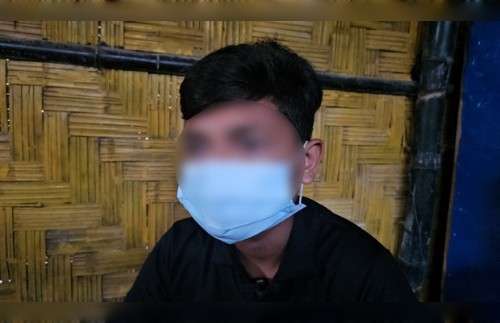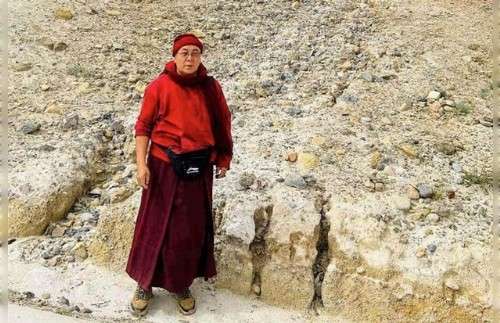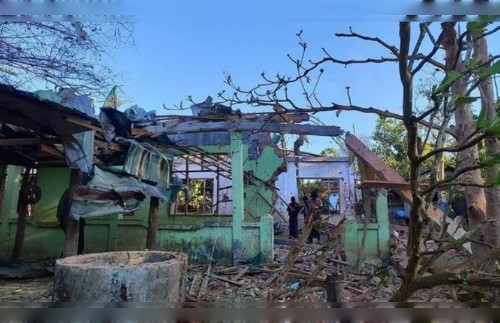
Authorities in Kazakhstan have set a date for the trial of rights activist Serikzhan Bilash, whose group Atajurt works to release ethnic Kazakhs from mass “re-education” camps in China’s Xinjiang.
Bilash, who has been under house arrest since his initial detention five months ago, will stand trial at a court in the Kazakh city of Nursultan at 11:30 a.m. local time on Monday, RFA has learned.
Bilash had been a vocal campaigner for the release of fellow ethnic Kazakhs from Chinese camps, where the ruling Chinese Communist Party has been holding more than one million ethnic minority Uyghurs, Kazakhs, and other Muslims in mass incarceration centers since April 2017.
He was detained amid accusations from Chinese officials that he had “fabricated” the cases he was documenting, in an arrest that was widely seen as being at Beijing’s behest.
Bilash’s lawyer Aiman Umarova received notification from the court that the trial would be held in Nursultan, she told journalists on Friday.
“I believe he is innocent, because he said that he would conduct an information jihad against discrimination against Kazakhs, Kyrgyzs, and Uyghurs in China’s “re-education” camps,” Umarova said.
“The evidence submitted by the prosecution includes witnesses … who are saying that these remarks have caused disharmony,” she said, adding that the witnesses were unknown to Bilash.
War of information
She said a video clip of Bilash talking about jihad had been edited to remove the context, which was metaphorical, and posted online by the Kazakh state security police and Chinese state-run media.
Bilash’s wife Layla said her husband hadn’t been referring to actual armed combat in the clip.
“The original comments made by Serikzhan weren’t about going to Syria with a machine gun, but about jihad as an information war, a holy war of ideology,” she said.
“We are currently compiling large amounts of evidence about the “re-education” concentration camps in Xinjiang, which will reveal the violence of the Chinese state towards Kazakhs, Uyghurs, Kyrgyz, Tartars and other Turkic minorities in Xinjiang,” she said.
Rights activists say Bilash’s arrest was a political decision, rather than a legal one, and came only after intense pressure from the Chinese government at the same time as bilateral negotiations for the release of ethnic Kazakhs from Xinjiang camps.
‘Vocational training’
Though Beijing initially denied the existence of re-education camps, Shohrat Zakir, chairman of the Xinjiang Uyghur Autonomous Region (XUAR), told China’s official Xinhua news agency in October 2018 that the facilities are an effective tool to protect the country from “terrorism” and provide “vocational training” for Uyghurs.
Reporting by RFA’s Uyghur Service and other media organizations, however, has shown that those in the camps are detained against their will and subjected to political indoctrination, routinely face rough treatment at the hands of their overseers, and endure poor diets and unhygienic conditions in the often overcrowded facilities.
Adrian Zenz, a lecturer in social research methods at the Germany-based European School of Culture and Theology, has said that some 1.1 million people are or have been detained in the camps—which would equate to 10 to 11 percent of the adult Muslim population of the XUAR.
In November 2018, Scott Busby, the deputy assistant secretary in the Bureau of Democracy, Human Rights and Labor at the U.S. Department of State, said there are “at least 800,000 and possibly up to a couple of million” Uyghurs and others detained at re-education camps in the XUAR without charges, citing U.S. intelligence assessments.
Citing credible reports, U.S. lawmakers Rubio and Chris Smith of the bipartisan Congressional-Executive Commission on China recently called the situation in the XUAR “the largest mass incarceration of a minority population in the world today.”
Since 1999, the U.S. has designated China a “Country of Particular Concern” under the International Religious Freedom Act of 1998, for having engaged in or tolerated particularly severe violations of religious freedom.
Reported by Qiao Long for RFA’s Mandarin Service. Translated and edited by Luisetta Mudie.
Copyright © 1998-2016, RFA. Used with the permission of Radio Free Asia, 2025 M St. NW, Suite 300, Washington DC 20036. https://www.rfa.org
















